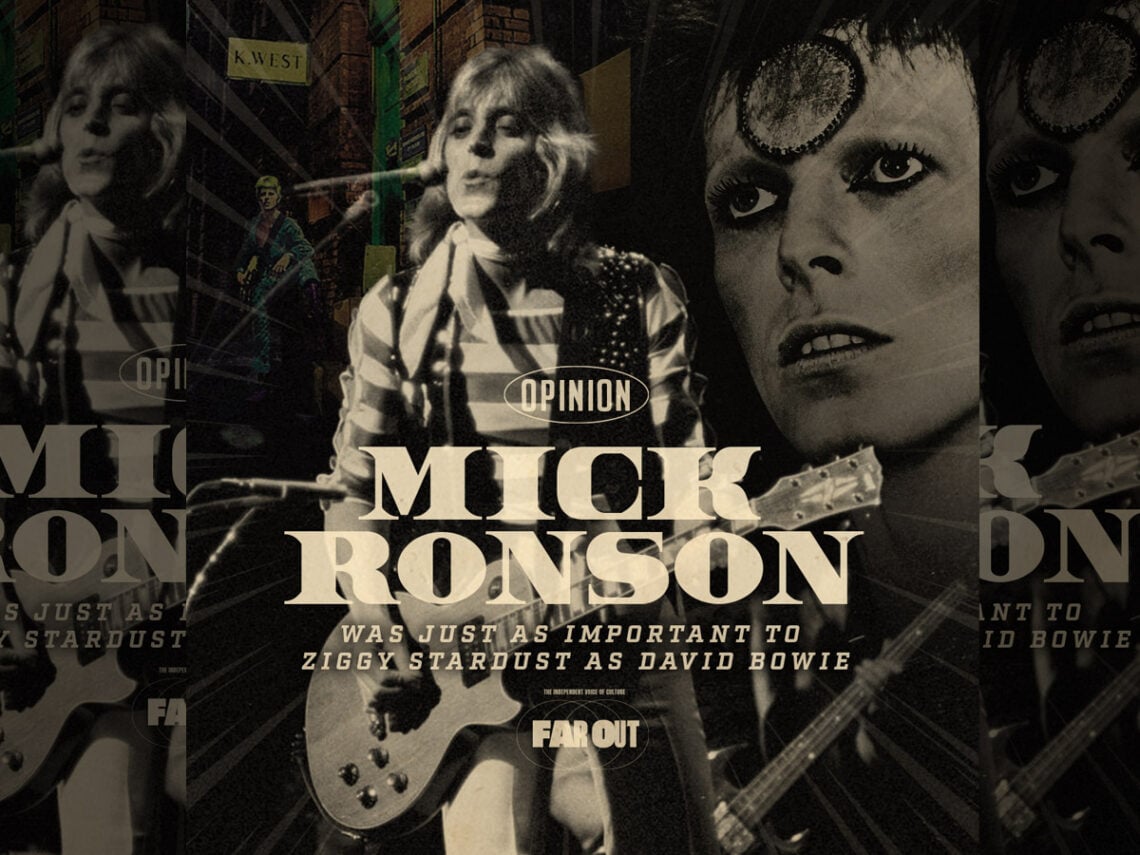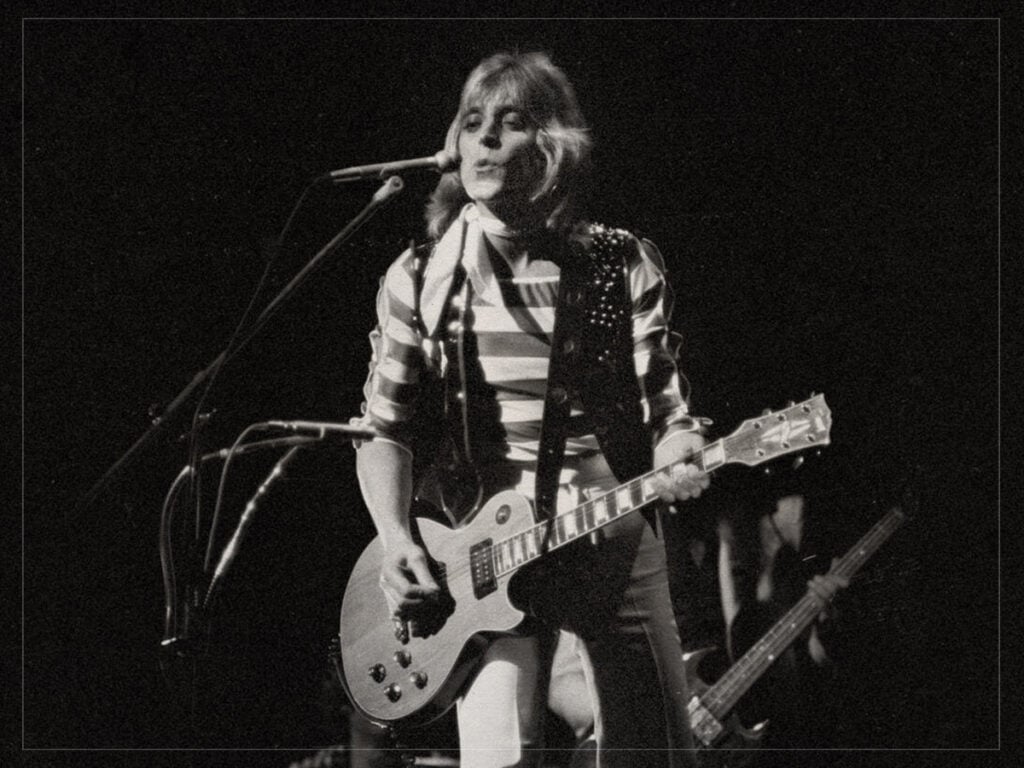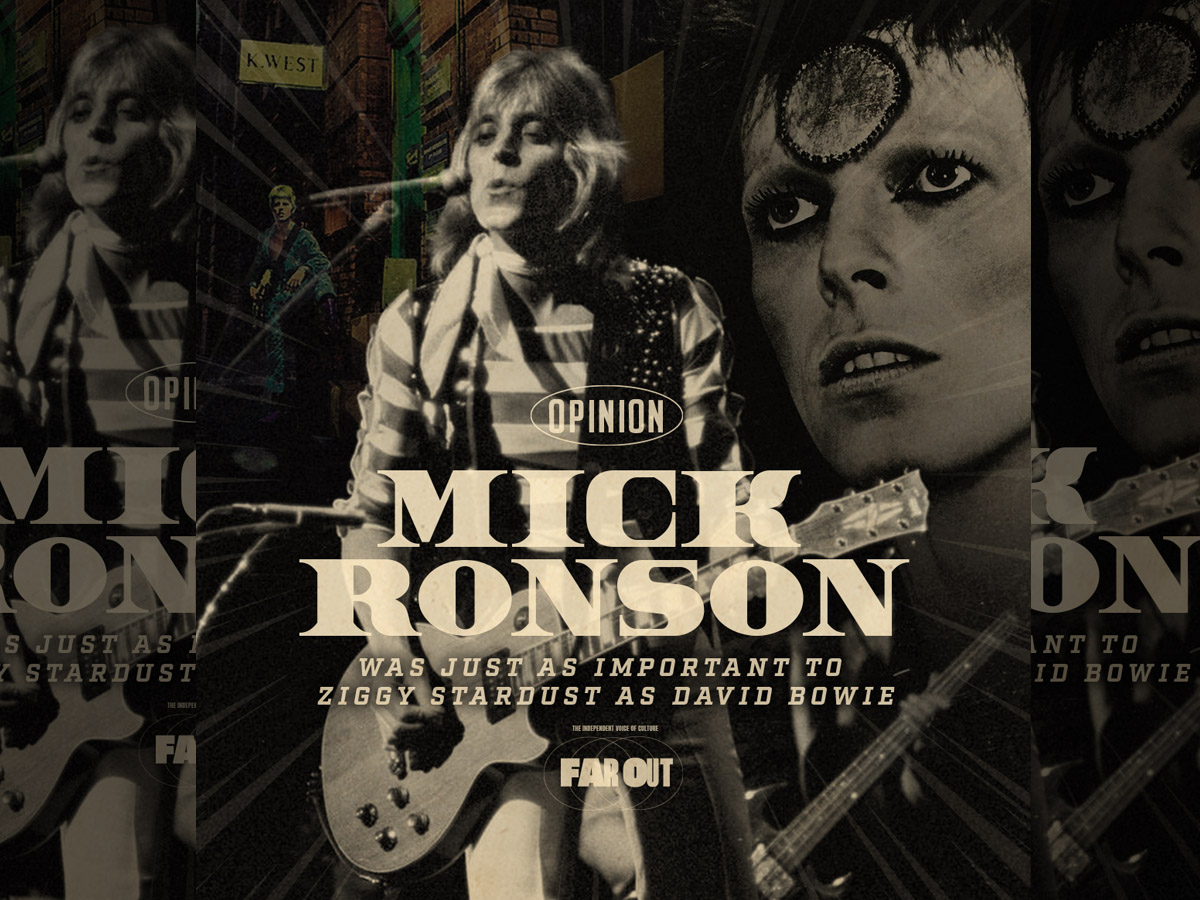
(Credits: Far Out / Alamy / Album Cover)
Tue 30 September 2025 18:34, UK
Mick Ronson was the sound of David Bowie coming back to earth.
This may sound strange. After all, the Hull-born guitar prodigy is most associated with Bowie’s Ziggy Stardust era. This was a time when both men looked like alien gods deigning to brighten Earth with their presence for a spell during an ongoing intergalactic voyage. However, no matter how often Bowie sang about sci-fi concepts like star-men waiting in the sky, an oncoming apocalypse in five years, and (checks notes) being too broke for the train home after a one-night stand, the actual music was more grounded than ever.
Bowie, after all, wasn’t really a rock ‘n’ roller before then. He’d got his start in the 1960s folk scene, and in 1970, his hits had been the novelty record ‘The Laughing Gnome’ from 1967 and ‘Space Oddity’ from 1969. Both of them were on the folk side of folk rock, and the albums he’d made supporting them had been cut from the same cloth. The follow-ups to both hits had died a death on the charts, and thus, for the first time, Bowie unveiled his super-power, his ability to evolve. The savvy Brixton native knew that folk’s time on the charts was up, and the next big thing would be something much, much louder.
Bowie’s friend and rival Marc Bolan was already leading the charge, having changed the psychedelic folk act Tyrannosaurus Rex into the raucous, stylish glam rock outfit T Rex. Thus, Bowie sought to do the same by recruiting his own backing band and cranking everything up to eleven. In a quite stunning sliding doors moment, Bowie made this decision at pretty much the same time that Mick Ronson himself had decided to knock his once-promising music career on the head and move back to his native Hull.
Despite playing for a number of local bands and even recording with Elton John earlier in the year, Ronson had become disillusioned with the London music scene and was convinced it would be nothing more than a hobby for him. To the extent that when Bowie’s drummer and Ronson’s old friend John Cambridge was sent to Hull to find him, Cambridge found Ronson marking out a rugby pitch for his new job with the local council. It took a while to convince him to give the David Bowie project a show, but thankfully, he did.
 Mick Ronson performing in 1975 (Credits: Far Out / Alamy)
Mick Ronson performing in 1975 (Credits: Far Out / Alamy)
After a few initial gigs as Hype, Ronson and the rest of Bowie’s new backing band were called back into the studio to help with Bowie’s third album, and first for Mercury Records. The Man Who Sold The World was something of a stay of execution for David Bowie, who was determined for this reinvention as a rocker to work. Ronson became the heart of his newfound hard rock sound, his growling Les Paul anchoring songs like the title track, ‘Black Country Rock’ and especially the opener ‘The Width of a Circle’, as spectacular a guitar track as anything being released in the early 1970s, which is saying a lot.
After all that, though, the album flopped commercially. However, the critical notices and the cult following the band’s live shows were picking up, which was enough to give the band another chance. Fun fact, Ronson and the rest of the backing band’s performances on The Man Who Sold The World were good enough to secure a record deal of their own, so they at least had that to fall back on if this Bowie lark blew up in their faces. However, the band were all in, so much so that they all moved into the same house, Hadden Hall in Beckenham.
This was where Ronson, along with bassist and producer Tony Visconti, built a makeshift studio into the stairwell, and where the demos for Bowie’s early 1970s work were recorded. Perhaps part of the reason that Mick Ronson and co. were all in on Bowie was because they could hear him cooking up the demos for what would later become Hunky Dory. Bowie’s first masterpiece, which, while another commercial flop, was so rapturously received that Mercury gave Bowie one last chance to hit it big.
By this time, Ronson was becoming much more than a lead guitarist. He was Bowie’s most trusted lieutenant, whose classically trained musical skill meant that he was tasked with arranging the strings for some of Bowie’s classic songs. ‘Life On Mars?’ is arguably as much a Mick Ronson masterpiece as Bowie’s, as the gorgeous string arrangement and ‘that’ guitar solo are as much a reason for its staggering greatness as anything else.
Thus, Mercury Records gave David Bowie one more shot, and the rest is history. Could Bowie have done it without Mick Ronson by his side? We’ll never know. However, what we do know is that when they were together, the duo made some unforgettable music, and for that, we should always be thankful.
Related Topics

